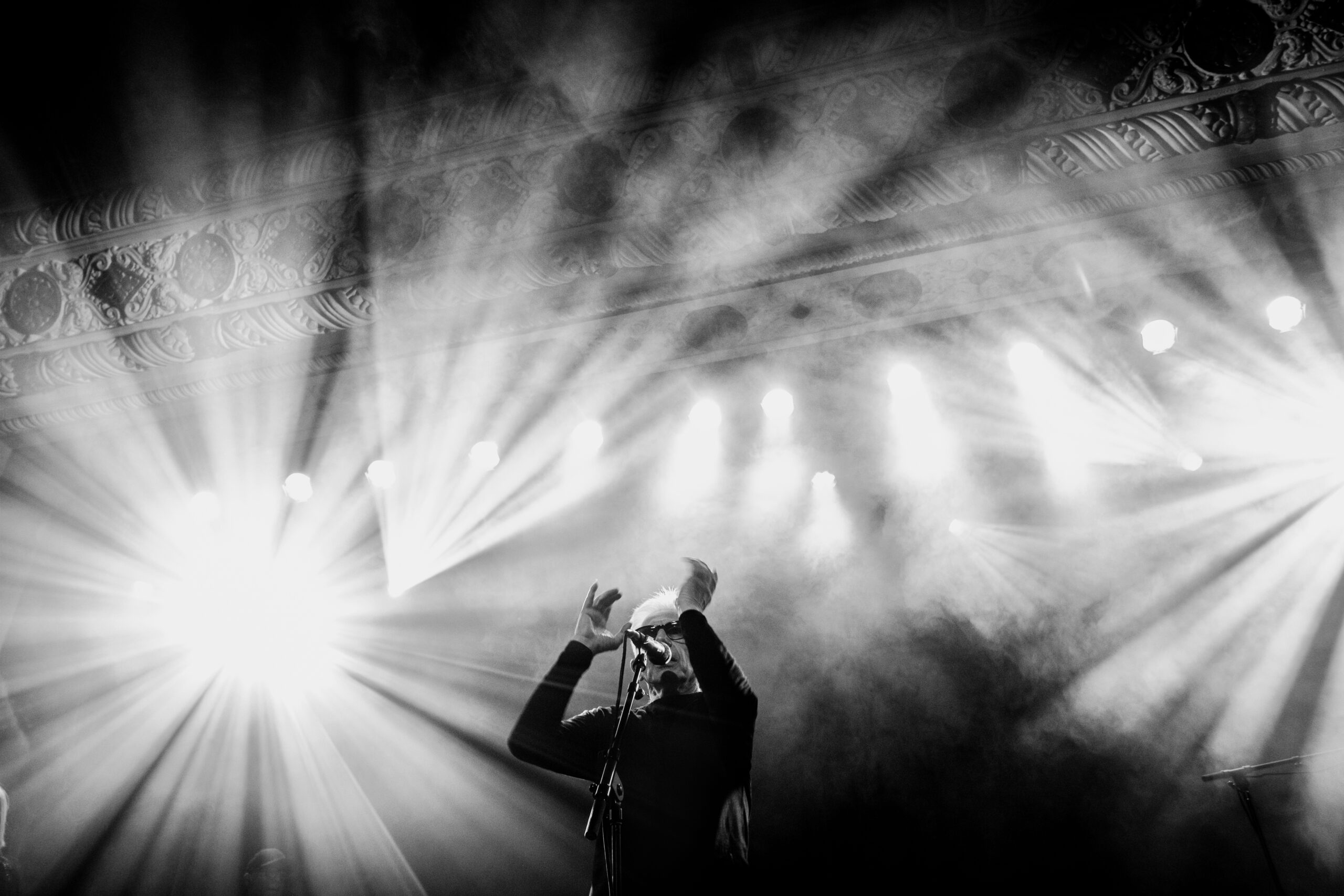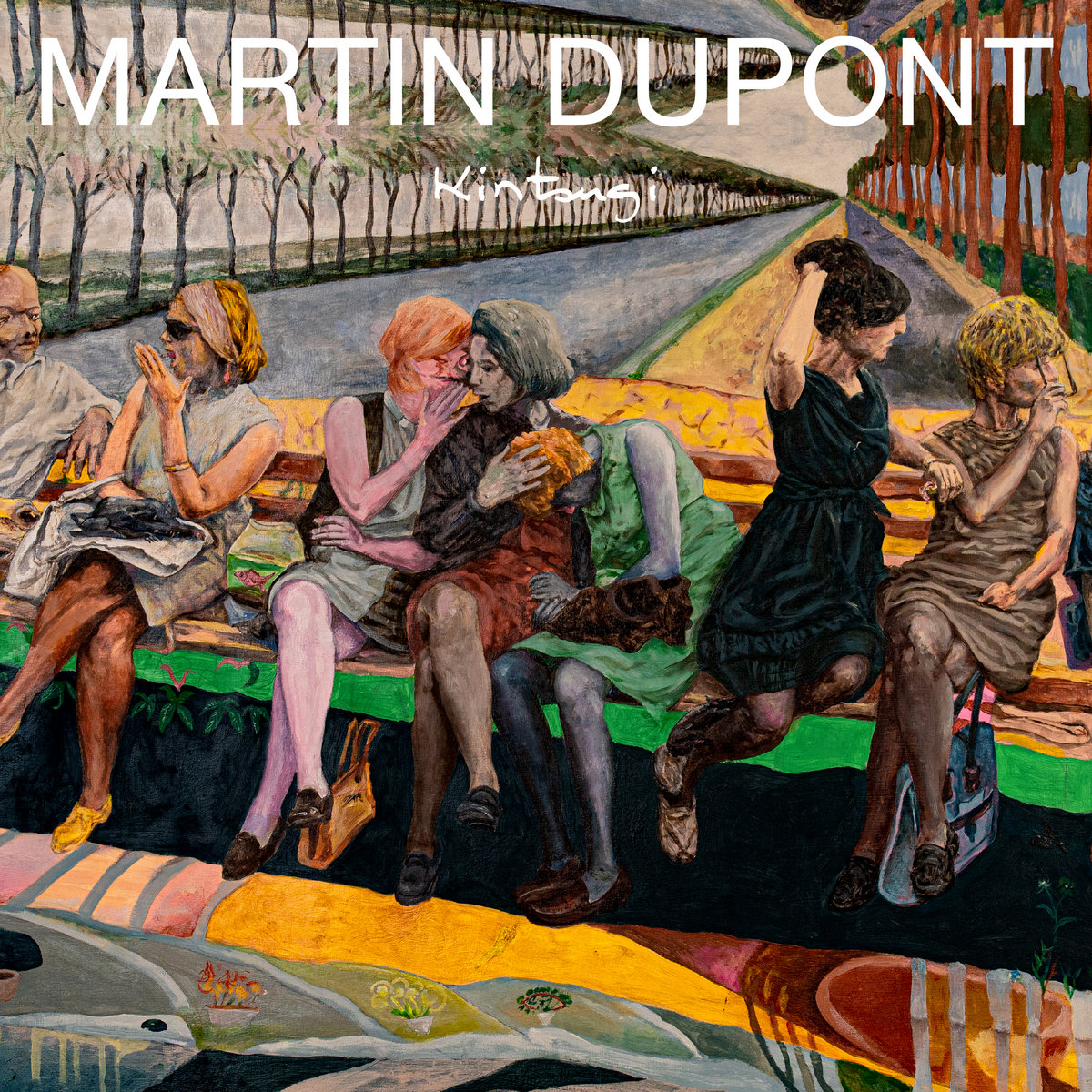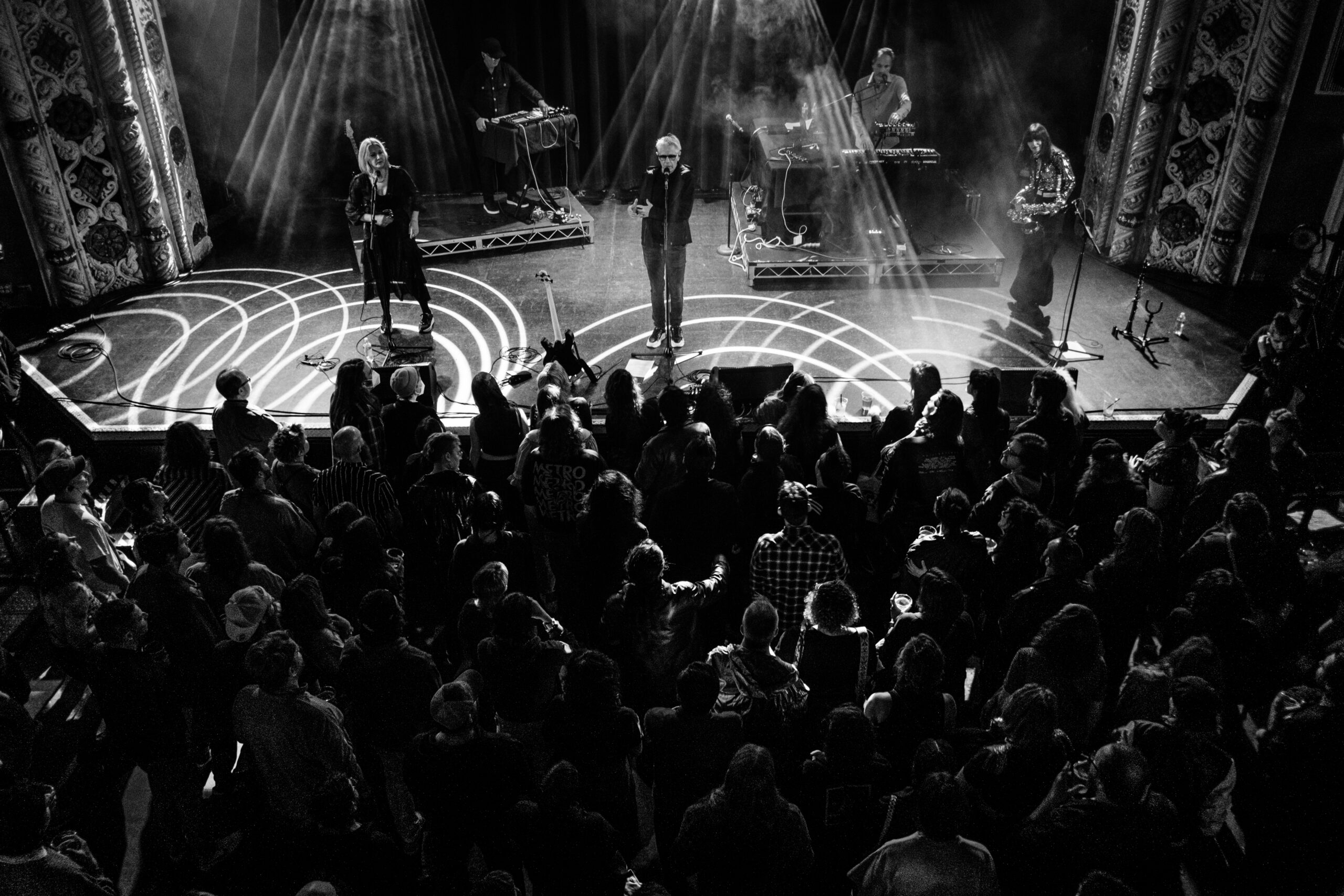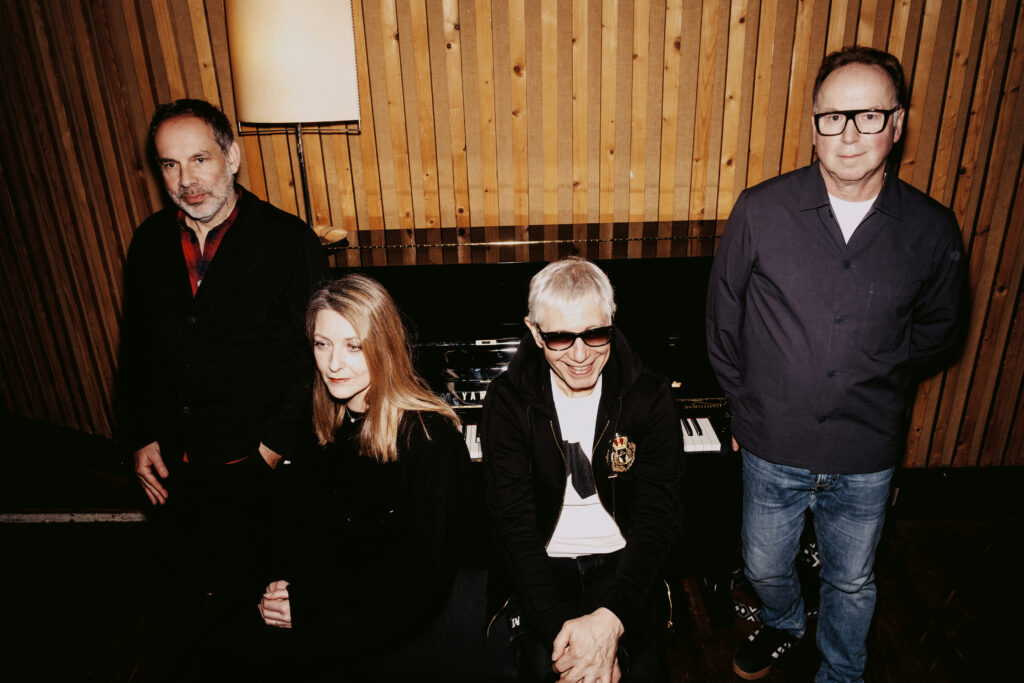Photos by Olivier Gamas
With the announcement of this year’s Substance Festival at the Great American Music Hall, we here at SF Sonic wanted to highlight some of the bands and artists playing over the three nights, whether they’ve been around for years or are early in their musical journey. For over forty years, Alain Seghir has spearheaded the French coldwave band Martin Dupont. After releasing four influential albums throughout the 1980s the band went on a hiatus, but a few years ago Martin Dupont returned, both to the stage as well as the recording studio. I was able to talk to Alain at length about my favorite songs by the band as well as his own surprise at the renewed interest in Martin Dupont.
Tyler King: First of all I wanted to thank you for agreeing to do this interview! I’ve been a fan of your music for a few years now so I’ve been looking forward to this.
Alain Seghir: I’m glad! Though I’m a bit surprised at the reaction that our fans have given us over the last few years.
TK: Really?
AS: Oh yeah, especially in New York. The crowd when we played there a couple of years ago was wild. And the show was sold out. Veronica Vasicka, who is the label manager of Minimal Wave Records, I had breakfast with her the day after and I said that I couldn’t believe the reception we had. And she said, “You must realize, you’re a kind of legend in the United States.” I would never think about myself like that, never.
TK: So you weren’t thinking about the longevity of possible lasting impact of your music when you were making it during the first phase of Martin Dupont?
AS: I just made music for my pleasure. I was listening to a lot of different kind of stuff, and it all resonated in my heart. To me music is emotion. So I didn’t plan to become known and I didn’t do anything to get in touch with a label or to play gigs. In fact, I gave cassettes to friends of mine and one day they decided to create a small label to issue my first single, “Your Passion,” in 1982. The story started like that, and I started the band with my girlfriend at the time and then with another girl I met at a rehearsal room and then this British girl who came to Marseilles who learned French, and I ended up marrying her!
To me, the name Martin Dupont was a way to distance myself from the releasing of the music. It’s not me. It’s nobody special. Martin is a common name for a French man. And often I was able to invite friends of mine who were passing through my house to make a song with me, and I must admit that often I didn’t spend a lot of time finishing the songs. It was a kind of mess. Maybe that could explain the energy of the first chapter of the band. For example, I was really surprised that “Inside Out” was put in the film Cuckoo last year. I don’t know if you have seen it.
TK: That was actually something that I wanted to ask you about! I saw the film in the theater last year not knowing that your song was going to be in it. And then when the scene came on that uses “Inside Out,” it was a total shock to hear your music in the film. I thought it fit perfectly.
AS: It’s just incredible that they used a song of mine from forty years ago!

TK: I listened to all of the Martin Dupont albums again in preparation for this interview, and one of the things that jumped out to me was this really big leap forward in terms of instrumentation, production, and songwriting from album to album. Did including all of the people that were passing through your house influence that jump forward in any way, or was that something that you were trying to consciously do?
AS: It’s not because of the people. Yeah, maybe the arrival of Beverly Jane Crew, and now having this English girl in the band in a way obliged me to be a bit more serious and try to finish the songs properly. But one thing that made a difference was the instruments, so I was able to improve the quality of the synths that I used. I don’t know if you know, but I developed an extension board for the first affordable digital synthesizer, the Yamaha DX7. I distributed that in the United States with a company in LA called Group Center. They were the distributors of the first electronic drum kits, Simmons. Mainly I work with analog technology, but once the DX7 was on the market I understood the potential of going digital, and with a friend of mine who was an engineer, we developed that extension board. And making that truly made a difference in the music I was making.
TK: You just mentioned that you prefer to work with analog equipment and not digital. The most recent Martin Dupont album, Kintsugi, is mostly rerecordings of older songs. Did you still use analog instrumentation on the newer versions of those songs, or was it easier to do them digitally? And also in revisiting those songs did you come away with a newfound appreciation for any of them?
AS: I try to not lose the heart of the song, the feeling of it. But I’m impressed by the new digital tools. It’s crazy what we can do now digitally. And I must admit that the new member of the band, he helped me a lot with the digital technology to “come back.” The story of the new chapter of the band started by pure chance. I met him at a concert in Paris and a friend of mine introduced me to him and he said, “Oh, I just bought a house close to yours.” So I eventually played him my songs, and he loved them instantly. And I told him that Veronica Vasicka had invited me to do some live shows of my own, but it was impossible. I hadn’t played for years, and I just wasn’t able to use the digital technology. He said he would like to try and see what he could do, and three days later he sent me new versions of two songs he remade completely. I was nicely surprised! The weekend after that I came to see him in Paris and I sang on the two songs, and I played the finished versions to a friend who had a label and he said, “Please, please can I put these songs out?” His reaction induced a new optimism in me, and when I started sending the new recordings to Veronica she was enthusiastic about them, and the story of the new chapter of the band started from that.

TK: What was it like getting onstage for the first time for this second stage of the band? That must have been exhilarating!
AS: Yeah! I started playing shows again in Marseilles, which is my birthplace, and I played in a venue where where I’ve seen many bands and I was a bit worried. I had the impression that I would feel like a cucumber in the middle of the scene, and I’ve never seen this place so full up! I mean, it was crazy! When we started to to do the sound check I drank a bottle of water in a hurry in a bottle of water and it ended up going down the wrong side! I said, “Oh I will not be able to sing, oh my god!” It ended up not being a big deal, and then it was the the time to go onstage. I’ve got a 9 year-old child, a lovely daughter, and I just wanted to give her a kiss on the head just before going from backstage and she was so glad that she jumped up and she crushed my mouth and I thought, “God this is the end!” So during the concert I started slowly, not really very in my element, but seeing all of the people smiling enthusiastically from the crowd, that’s a miracle because it helped a lot.
Another funny thing is that at the very first gig in the United States was in San Francisco at the Great American Music Hall and when we arrived the support band, Sacred Skin, was doing a their soundcheck and I was thinking, “Oh they are so good I will not dare to play afterward.” And uh when it was our turn to do the soundcheck the frontman of the band came to me and said, “I’m so honored to play with you.” And I thought “I’m the one that’s so lucky!” And it was the same scenario where I started out very worried not really feeling easy, and it ended up in a very very friendly and enthusiastic atmosphere.
TK: You mentioned the support band telling you what an honor it was to play with you. Do you keep up to date with current bands that are making electronic music or do you prefer to not maybe be subconsciously influenced by what’s going on in the “scene,” so to say?
AS: The thing which allowed me to spend all these year without playing live is that I bought thousand and thousands of records. I love discovering music and I must admit that I’ve got a very eclectic taste. I was able to listen to contemporary classical music, avant-garde jazz, and many electronic stuff of course. Coldwave, or pop of any any kind, even nu-metal! I mean, many different things, and I mean listening like a kid. Just listening with emotion. I often buy records from the the bands doing support for Martin Dupont, or when I go to a gig I buy records even if I’m not 100% in love with their music. But I listen to it and sometimes I get a nice surprise!

TK: I wanted to talk about a couple of your songs specifically. Like I said earlier, I was going through listening to all of your music and there were two songs that really stuck out to me. The first one was “I Met the Beast.” I don’t think that there’s another song in your catalogue that’s quite like it. I think it’s a bit, and I could be wrong in this assumption, but it feels evocative of stuff like Cocteau Twins or Siouxsie and the Banshees, who you opened for, and I was wondering if you’d be able to talk a little bit about the creation of that, specifically about that really beautiful guitar line on the song.
AS: There’s a funny story. When we played in Marseilles opening for Lotus Eaters, the bass player of the band was Michael Dempsey who played in the very first line-up of The Cure, and then with Roxy Music. And the funny thing is that after our set before the the the Lotus Eaters played he was singing “I Met the Beast” backstage and after the gig he came with us to a restaurant to hang out with us. He became a friend.
But I don’t know how I did this song. I’m still trying to find a very early version where I was the singer because I love that version as well. Recently we made a new version to play live and, I mean I’m subjective, I admit, but it’s very interesting. It’s powerful. And so I made another version of the song, and we are ending the brand new album with it. This time it’s brand new songs. We’ve got twelve songs ready and we’re still writing and working on more songs. We’ve got a lot of stuff and we’ve got friends who want to to do covers of our songs. So we plan to to do another album to issue some some months afterwards called maybe Martin Dupont And Friends with American bands and French bands. I’m glad that you mentioned that song because it’s really one of my favorites.
TK: It’s probably my favorite song of yours. The other one that I wanted to ask about is “Love On My Side,” which I think is just one of the most sincere love songs I’ve ever heard. There are a lot of really great love songs where the lyrics might get a bit wordy and a bit complicated just to get across what love is. I think that the lyrics of “Love On My Side” are so straightforward and matter-of-fact and to-the-point and there’s a beauty in the simplicity of the lyrics. I was wondering if that was that a conscious decision when you wrote the lyrics that you just wanted to be very matter-of-fact?
AS: You know what? It gives me goose pimples to hear that because honestly, it was the end of the band. Beverly was back in London and I was on my own in the studio and just playing the song and it came like that. I wasn’t thinking about the quality of the lyrics, I wasn’t thinking about the composition. It’s funny because a German director took the song for a film in Berlin about the Berlin youth, and I told her that I’ve got a brand new version of “Love On My Side” on the new album, and she said, “No no, I love the very first version.” So when doing the later version of the song, Beverly was there when I recorded it and I said, “Oh just do this bit with the saxophone.” And it was the first take of the singing, and it’s funny because it surprises even to this day the rest of the band that most of the time I use the first take. I create the melody and the lyrics in in the first shot. There’s a British musician living not far away and we are quite friends and I asked him if it was ridiculous, how I do it, and he said, “No no, you you’ve got a way with words which can touch us. There’s a kind of poetic realism.” Honestly I’m afraid sometimes to look silly with with my simple words.
TK: With with that song, and I mean really with any of your songs, what is the decision that is made for you between wanting the lyrics of a song to be in French or in English?
AS: Maybe it’s silly but I didn’t want my parents to get what I was singing! That’s the main story! It was not a question of fashion or whatever. Sometimes I live my with my heart going on and I was shy. And most of my emotion goes through love, death, and so on. And I wouldn’t want my parents to to hear my love and suffering and things like that.
TK: After the first incarnation of the band ended there’s this big gap in between where you started Martin Dupont up again. I know that you went into the medical profession, and now I’m assuming you still are in the medical profession. I’m wondering, how do you juggle between these two seemingly very different sides of your life?
AS: The first thing is that my secretary became my assistant and she planned everything for me. She knows that I will play in Berlin or Paris or wherever and she she helps me to to plan my schedule. I try to be very professional and serious and I must admit, lucky me, I’m at a point in my career that I am head of a big department. I was president of a lot of medical stuff and so on. And people are coming from far away, sometimes they have to drive two hours to to come to see me, and I was afraid because when French TV started to speak about me I thought people would think, ‘That’s not possible, we can’t be operated by somebody like that!’ And it was the opposite! I had many patients telling me, even old people, “Oh we are so proud of you doctor, and we trust you.” I even had people who went to see me and to be operated by me because they fell in love with my music.
TK: I’m going to be at the Substance Fest in San Francisco and I’m wondering, what can the people there expect from your set and is there a possibility that you will play “I Met the Beast?”
AS: I will, I promise you!
Follow Martin Dupont on Instagram here
Tickets for Substance Fest can be purchased here


